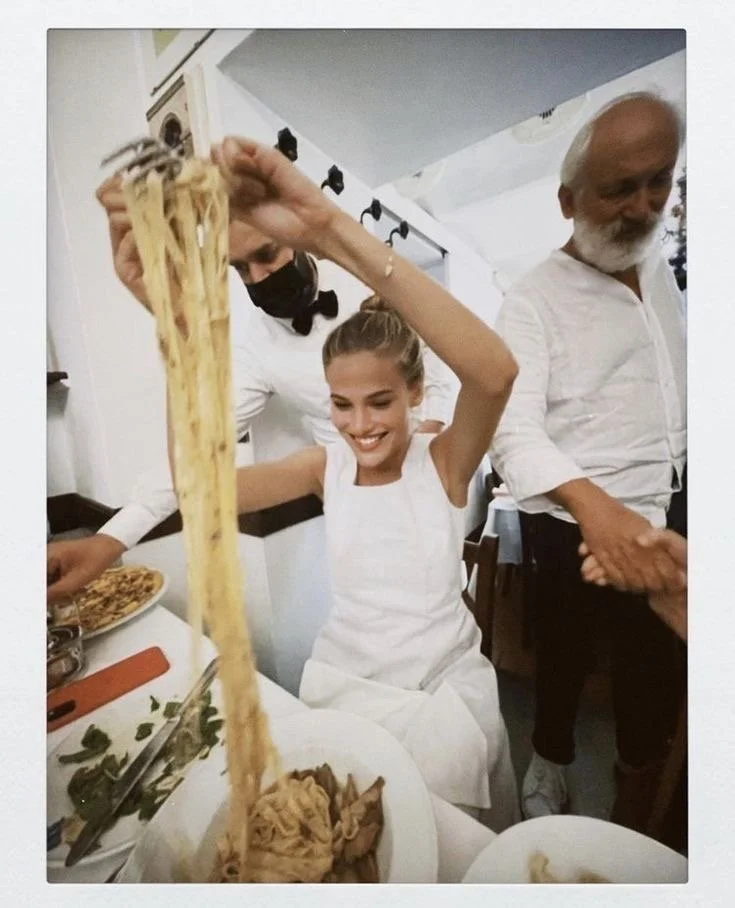What We Can Learn from the Italian Dolce Vita Lifestyle
By Lillian Ferrell
The carnivore diet, 75 hard, veganism, and soft cardio — we’ve heard it all. There are countless diet and wellness trends promising longevity, health, and fitness for young women. As a college student, I am bombarded with social media content prescribing the “right” ways to workout, eat, and sleep. The perfectly curated and filtered “what I eat in a day” routines are too complex, expensive, and unsustainable with a work or school schedule. My recent study abroad trip to Italy opened my eyes to the beauty of going back to basics with nutrition and lifestyle.
Here are elements of the dolce vita Italian lifestyle that resonated with me.
1. Eat locally and in season
The true beauty of Italian cooking is the simplicity of the ingredients. Dishes are not over complicated. They are centered around what is in season and available at markets on a daily basis. Italians take pride in knowing their farmers and working with the produce, dairy, and meat products unique to different seasons. The local cuisine uses bright tomatoes, sharp pecorino cheeses, and handcrafted pastas. Some of my favorite meals on my trip were as simple as prosciutto paired with a fresh cheese and wine to share with my friends as an aperitif.
2. Walking and low impact movement
Italians walk everywhere, and, no, it is not to hit a “perfect” number of steps every day. Walking is simply an integral part of European lifestyle. We should take a page out of their book; it not only alleviates stress and improves mental health but also is a great way to explore a new city.
There is something magical about wandering through foreign streets teeming with whimsical shops, gelaterias, and cafes. Emphasis is not placed on “getting a workout in,” but rather on enjoying the day with the added benefit of moving the body.
3. Community and conversation with others
This was arguably the biggest shift I noticed in Italian lifestyle when compared to that of the average American lifestyle. Italians are in no hurry to rush through breakfast or work through dinner. In fact, meals and morning espresso are intended to be times of social connection, facilitating deep conversation with loved ones on a regular basis. Take-away coffee is non-existent in Italy as cafes serve cappuccinos and espresso at the counter in glass cups for the sake of enjoying your drink instead of rushing out the door.
Our first three-hour dinner abroad was an entirely foreign experience to us as American students. It was over those meals that I grew to know and deeply appreciate the people I was traveling with, in a way I would not have otherwise. Slowing down to connect socially with those around you brings a vibrancy and joy to all moments of life, reminding you to appreciate your company.
4. Spirituality
In Italy, you can find cathedrals all around. Christianity and faith are integral to the culture and beauty of Italian cities. It was incredible to see the normalization of attending church or mass and how the belief in something higher than oneself grounded attendees.
On Sundays in Italy, it is rare to find grocery stores, restaurants, and pharmacies open in the mornings, as it is normal for each place of business to adjust their hours for patrons and employees to attend church.
While there is no universal recipe for a life well lived, I can attest that these elements of Italian lifestyle will enhance yours in countless ways without you paying a fortune for supplements, workout classes, or trendy holistic therapy sessions.
Dolce vita — a lifestyle of soaking in simple joys — offers simple habits we can integrate into our routines to live a better balanced, more jubilant life. We should bring a little Italian summer to the beautiful country we call home.
Lillian Ferrell is a sophomore English major at Hillsdale College in Hillsdale, Michigan. She is studying classical opera and French in addition to English. She is a member of Hillsdale's KKG sorority, and is the marketing and operations director for Hillsdale's Federalist Society chapter.



